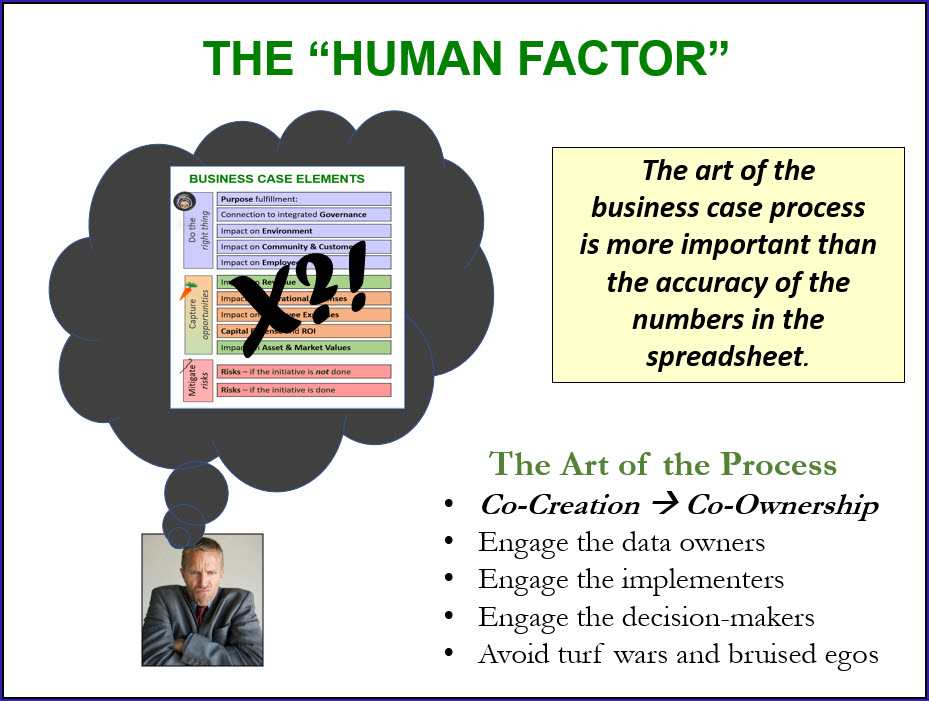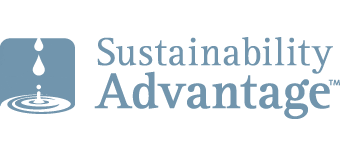5 Essential Conversations for a Winning Sustainability Proposal
 Sustainability champions need to obtain executive approval for their proposals. Executive decision-makers must to be convinced that any proposed sustainability initiative will be good for the company as well as good for the environment, society and other stakeholders. That’s their fiduciary duty.
Sustainability champions need to obtain executive approval for their proposals. Executive decision-makers must to be convinced that any proposed sustainability initiative will be good for the company as well as good for the environment, society and other stakeholders. That’s their fiduciary duty.
The Sustainability ROI Workbook is a comprehensive tool that helps frame a compelling business case using quantified / monetized benefits. But it’s just a tool. Savvy sustainability champions know that the art of building a winning sustainability business case is more important than the accuracy of the numbers in the workbook. They are sensitive to the “human factor.”
Let’s suppose that you want to propose a on-site renewal energy installation at company facilities. You will need help from several departments to complete the justification for the project. There are 5 essential conversations for a winning sustainability proposal. Their tone is as important as their content. Let’s start with the tone of your conversation with the CEO.
Ask the CEO for permission
Honor past efforts and reference new news.
“I notice that a couple of our competitors are installing renewable energy facilities and getting good press for doing so. I know that we have looked into renewable energy before, but couldn’t justify proceeding. In the last couple of years, the costs of wind, solar, and geothermal installations dropped dramatically. A price on carbon is imminent, and it looks like our stakeholders are more concerned about climate change than they used to be.”
Ask for permission and build trust:
“Would you like me to work with the operations and facilities people to explore the business cases for several renewable energy options, and see if any of them are strong enough to warrant approval? If they are, great. If not, we will be making a better-informed and more current decision on why not to proceed.”
Ask the CFO for the CAPEX Appraisal Form
Ask for a copy of the Finance department’s normal “Capital Expenditure (CAPEX) Appraisal Form,” or “Application for Expenditure Form,” or “Capital Budget Request Form,” or form with some such name.
“The CEO would like us to explore whether we can justify using on-site renewable energy. We want to ensure that any proposal is assessed as rigorously as we would any project that requires upfront capital. Would you be able to provide me with our normal CAPEX Request Form so that we make sure our proposal contains the information that you need to make your decision?”
Seek prior agreement that additional sustainability-related direct and indirect benefits can be included.
“I’ve noticed that CPA organizations are suggesting additional factors be taken into account when making CAPEX decisions in today’s chaotic business environment. They encourage considering how the proposed project helps fulfill the company’s purpose and mission, estimating risks of not doing the project, assessing potential enhancement of related asset values, and a few other factors. Would you be comfortable taking them into account if we include these kinds of supplementary benefits in our proposal, if there are any?”
Ask data owners for baseline company data and assistance with assumptions
Engage appropriate departments (e.g. Finance, Sales and Marketing, Operations, HR, Marketing, Investor Relations) to provide the best available and consistent baseline data.
“The CEO and CFO are curious about whether we can justify an inhouse renewable energy installation of some kind. Of course, we need to make sure we are using accurate baseline data when we estimate potential savings, revenue improvements, and risk avoidance that might result from the project. If we show you how we plan to use the data in our business case tool, would you be comfortable providing us with appropriate values to plug into the baseline company data profile?”
Ensure they support your projected direct and indirect benefits of the project.
“We want to make sure we make reasonable assumptions when we project the potential direct and indirect benefits of this initiative. You are the expert and may be asked by the CEO and CFO to confirm that estimates used in the business case are reasonable. Just in case, and based on your experience and expertise in this area, can you help us with quantifying the potential improvements to some line items impacted by this project?”
Ask implementers to shape and support the proposal
Co-create the business case with the department(s) that will be asked to implement the project if it is approved.
“The CEO and CFO have asked me to take a look at the business case for installing on-site renewable energy capability in our facilities. If the business case is good enough and they decide to proceed, you will probably be asked to make it happen. We want to ensure the project is managed, staffed, and staged in a way that works for you folks and allows for associated costs. Would you be willing to help us size and stage this project?”
Co-propose the project with the implementing department(s)
“This could be a milestone project for the company. To ensure you get the credit for its successful implementation, would you like to co-create and co-propose the project so that your support and role is visible to senior management?”
Ask coaches and mentors for guidance on internal politics
Get their advice on the context to use, and not use, when framing the project in the above conversations..
“Are there any hot buttons, priorities, or personal biases that I should be aware of when talking to [person x}. Do they already have a point of view about these kinds of projects that I should play to, or avoid? Is there terminology or associated environmental and social issues that would be good to reference, or landmines that I should avoid, when framing the context for the project?”
Ask them to informally influence decision-makers and use them to dry run your talking points.
“Are you comfortable enough with the project idea that you would encourage [managers they know] to help build the business case for the project? If you were them, knowing what you know about the project, would you approve it? Is there anything else you need from me to earn your support?”
The credibility of a business case rests with the sources of its data values and assumptions. The successful implementation of a project depends on the level of engagement of the above five stakeholders while building its business case. As a minimum, avoid ticking off data owners and implementers by taking forward a proposal that they should have thought of before you did. If they sense that you are making them look bad, they will ensure that your project doesn’t succeed. Don’t let that happen. Share the credit for the proposal. Engage with them and help them look good in the spotlight. With their help, so will you, even though you are in the shadows cheering them on.
Bob
Please feel free to add your comments and questions using the “Leave a reply” comment box under the “Share this entry” social media symbols, below. For email subscribers, please click here to visit my site and provide feedback.



